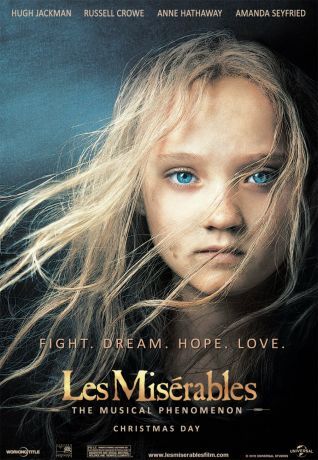Arts
You are here
Do you hear the people sing?

January 17, 2013
Since December 25, social media have been buzzing, especially on the left, about the movie Les Misérables, with Hugh Jackman and Anne Hathaway. With good reason: it’s hard not to be inspired by a movie full of red flags and revolution. There are also lessons for the left in the story, which is always a good thing. But Les Misérables is also, simply, a fine movie.
Warning: spoiler alert.
Victor Hugo, the poet and novelist, was also a radical intellectual at a time in France when the bourgeoisie was still a force for political change. He participated in several revolutions, and was elected to the National Assembly twice: after the 1848 revolution, and after the Paris Commune.
During his life, he broke with the Catholic Church over its indifference to the plight of workers. Hugo wrote his novel, Les Misérables, while he was in self-imposed exile in England. While there, he also wrote two political pamphlets against the dictator Napoleon III, only returning to France after the Paris Commune and the beginning of the Third Republic in 1870.
The events of Les Misérables are based on the ill-fated revolution attempt—the Paris Uprising—of 1832. Following the riotous revolution of 1830, which succeeded in drastically reducing the power of the monarchy, a movement largely made up of students hoped to repeat the past and finish the revolt against poverty and the desperate living conditions of Paris’ burgeoning working class.
The students in the film’s events clearly have Hugo’s sympathy. Their desperate last stand and revolutionary anthems on the barricades at dawn don’t fail to evoke tears from the sternest viewer.
The mistake the students made was to assume the people would rise spontaneously to follow them. But past mistakes are mistakes in retrospect, not necessarily for those who made them. The students of 1832 were trying to reproduce what they had, in fact, experienced: a largely spontaneous uprising of the masses. The working class movement and the selling-out by the bourgeoisie with the development of capitalism were only just beginning to be observed, let alone theorized.
So when a student leader sings a lament for his lost comrades, the audience laments with him; and when Hugo’s heroes Valjean and Fantine sing about their own motivations for their actions—love—the audience can’t help but agree. Love, and passion for ideas, is a potent mix.
Today we know more about how movements work, especially since the further development and solidification of capitalism. But we, in 2013--after the Arab Spring, Occupy, the Printemps Érable, and now Idle No More--are inspired by the events of 1832 in Paris as few other stories to hit the big screen have been able to inspire.
Jackman and Hathaway are brilliant. Russell Crowe’s Javert is solid, Helena Bonham Carter and Sacha Baron Cohen are hilarious, and the performance by relative “unknowns” Eddie Redmayne and Samantha Barks in the roles of Marius and Eponine are flawless. Les Misérables uniquely combines the raw emotional power of musical theatre with the immediacy and intimacy of film as well as the hyper-realism of contemporary cinematic techniques. So see it on the big screen while you can.
Section:
- Log in to post comments









